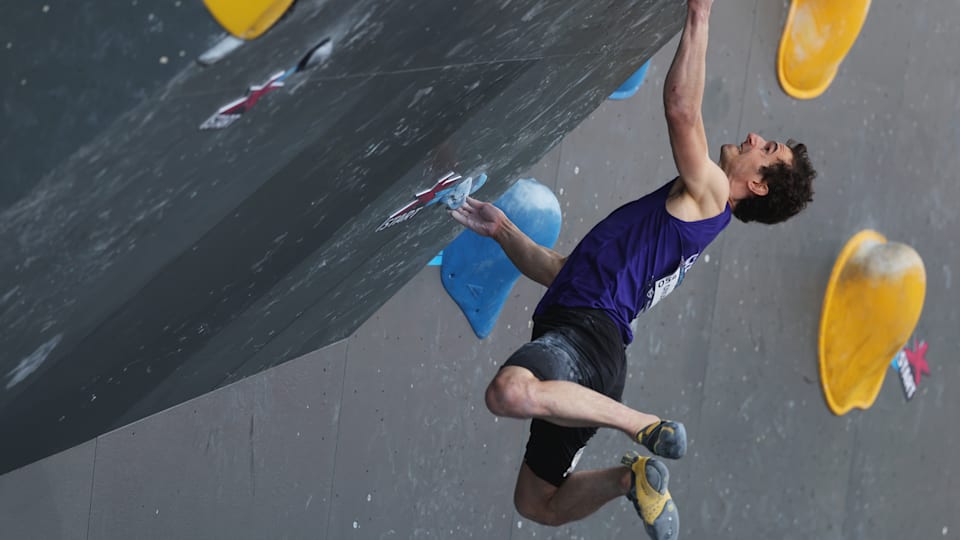Climbing phenom Adam Ondra back in competitive arena at debut home event in Czechia
Prague hosts the latest World Cup series event in 2023 with climbing phenom Adam Ondra returning from the rocky outcrops to the competitive world in which he excels, and this time, he'll be in front of his home fans.

After tackling what is considered the hardest rock climb in the world – a 45-metre pitch curving up a wall in a Norwegian cave – Adam Ondra screamed.
Straining every sinew, from holding his bodyweight by his fingertips to hanging upside down by his foot, the Czechia athlete became the first person to climb a 9c, achieving the feat accompanied by his renowned exultation comprising screams, grunts and growls. “It might sound bad,” said Ondra, “but it helps me.”
The name Ondra gave the venture? Project Silence.
Ondra, who is taking part in his first IFSC Climbing World Cup event of the 2023 season – the inaugural competition in his home nation from Friday 2 June - Sunday 4 June – is a climbing phenom. Both of the outdoor pursuit and the competitive sport in which he is a five-time world champion.
A specialist in the more methodical bouldering and lead events as opposed to speed climbing, Ondra was unable to achieve higher than sixth at the sport’s debut at the Olympic Games Tokyo 2020 in which the three disciplines were combined. A rare off day in bouldering halted his chances of an Olympic medal.
With the separation of speed climbing as a stand-alone event at Paris 2024, Ondra will be looking to add Olympic gold in bouldering/lead to his medal collection.
But, to get there, Ondra needs to balance his adoration of the outdoor version with the different challenges posed by the indoor grind.
Adam Ondra on his sport climbing challenge
“In my heart, I definitely feel like a rock climber,” said Ondra in a four-part YouTube docu-series, detailing his Olympic journey, “but from time to time, deep in my body, there is this hunger for going into a competition and really enjoying the sport side of climbing.”
“Locking yourself in a climbing gym and just train, train, train, sacrificing the rock climbing and then going out there and under total pressure performing as good as possible. It’s an interesting process. You get to learn a lot about yourself,” said the 30-year-old father of one.
Oft cited as the world’s best climber, Ondra says sport climbing is “the only way to objectively compare yourself with the others”, but equally, is philosophical about what winning actually means.
“I truly don’t know how much it’s the ego thing or how much it’s the will or hunger to be admired, to show the others, oh my god, I’m the best,” said Ondra with characteristic truthful introspection.
“It’s still difficult to say if you win the world championships, that you’re the best climber in the world, but at least you climb the highest on that given day on that given route.”
He also understands the ego aspect can only motivate him so far. On tired days, he may visualise how it will feel if he does well in a competition in order to push himself, but he also thrives on the training process so rarely needs that tool.
Rock climbing, meanwhile, is "a lifestyle", says Ondra, "not just a sport". He loves the challenge of climbing the world’s hardest routes, being out in nature, travelling and meeting new people. “I even enjoy those endless hours of driving in the car,” he says.
Sacrificing rock climbing for a competitive edge
The lure of an Olympic Games for his sport in Tokyo, proved irresistible to Ondra, who cited before the Japan Games that he likely wouldn’t be competing anymore but for the sport’s debut.
“The fact you win the World Championships three, four, five times it doesn’t really change that much, and the experience is still kind of similar. But the Olympics, for the first time ever, that’s a huge source of motivation and the preparation will be the biggest challenge I’ve ever faced.”
Now, ahead of the sport’s second appearance at the Olympic Games, Ondra’s challenge is again to balance the outdoor pursuit with the intense focus required in the arena.
“If I go for the competition, I have it deep in my mind that I’m sacrificing the rock climbing that I Iove.”
Ondra will be doing everything in his power to make that sacrifice worth his while.
